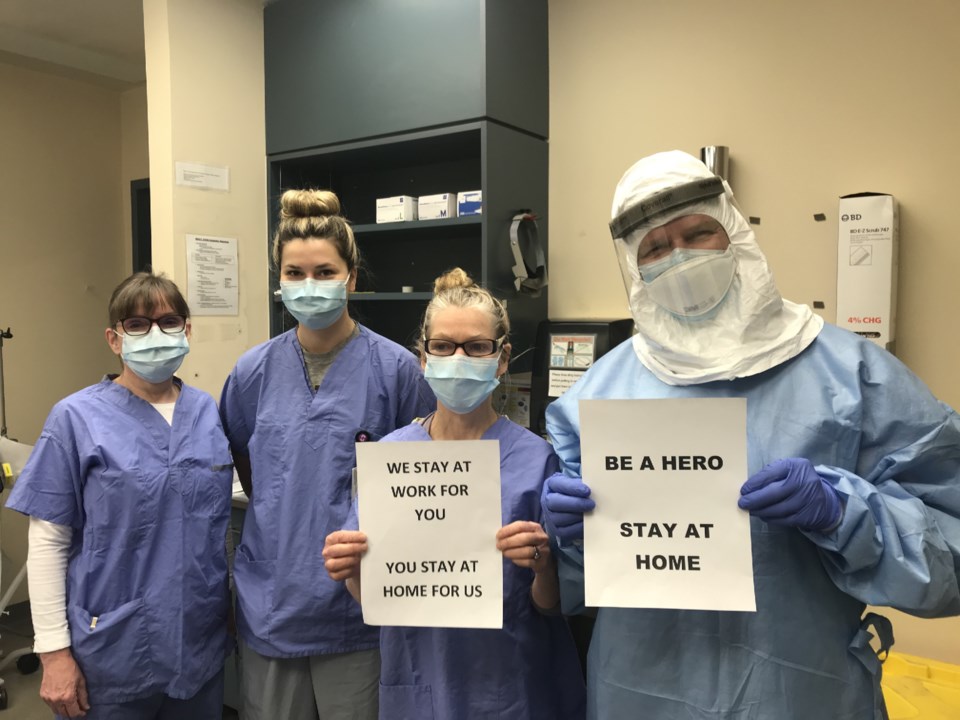Thank you, Whistler, to every single person who is working to keep themselves healthy and safe from COVID-19. This will keep others safe, too.
Our family doctors in Whistler have been very busy providing telehealth advice and care to patients. The combination of you taking care of yourself, and the primary care doctors, nurses, allied health professionals and specialists providing virtual care and telephone advice, has vastly reduced our patient volumes in the emergency department at the Whistler Health Care Centre (WHCC).
In addition, [the effects of] tourists, visitors and seasonal workers going home, public facilities and parks being closed, and even our own mountains being closed, has also contributed to fewer people requiring medical care. And this is so very necessary as we work tirelessly to prepare to be able to deliver the very best care to those who need it in the weeks ahead.
Yes, the coronavirus is here in our community and it is going to get worse before it gets better, just how much worse depends on you.
All the modelling predictions suggest that we are still in the very early stages here in Whistler. Conversely, there is at least one facility in the Lower Mainland where it seems to have peaked and patients are beginning to recover.
This means your personal behaviour will continue to play a very important part in how hard this virus hits our community, how quickly it spreads, how many people it infects, how sick the more vulnerable people become, how many patients we will have to care for in emergency, how many patients we will have to transport to the city to intensive care, and how many people may die.
This novel coronavirus pandemic is the biggest global threat we have ever faced where the actions of every single person can make a difference every second, minute, and hour of every day.
COVID-19 is a virus. It dies without a host. You are a potential host. If you don't let it live in you, it will die. If you don't pass it on to other people, it can't hurt them. You can carry the virus and not even develop any symptoms. If you do pass it on to someone unknowingly, they also may not have any symptoms.
Most people, however, will have minor flu-like symptoms and recover completely. But some people could become extremely ill, requiring intensive care, or even die.
The elderly and people who have underlying medical conditions face higher odds of getting really sick or dying from COVID-19, particularly those with heart disease, diabetes, high blood pressure, lung disease (asthma or COPD), and cancer. If you take the necessary precautions to prevent catching it and carrying it, you keep your community healthy.
There has never been a time when personal stewardship and responsibility can have such an impact on our own health, the health of those we love, and the health of our community. So wash your hands, don't touch your face, wash your hands. Practice physical distancing and help others do the same. Be careful with surfaces in public spaces—gas pumps, touch pads, mobile phones, laptops, bank machines, door handles. Don't pass around a joint; don't exhale forcefully. Sneeze or cough into your elbow, or wear a mask if you have a chronic cough. And wash your hands, don't touch your face, wash your hands.
If you aren't working, use this time as a gift. Self-reflect about your priorities, meditate (whatever that looks like for you), re-connect with loved ones virtually, or better yet, write them a good, old-fashioned letter or give them a call. Get going on your home to-do list, read that pile of books, learn to cook nutritious, wholesome foods at home, do sit ups, take good care of your own body joints, practice yoga, sing to yourself or online with others, learn a new language, learn to play the ukulele.
Look after yourself—drink plenty of fluids, practice good sleep hygiene, eat well, stay connected. Take your regular prescription medicines or inhalers. If you need to take a medication for pain or fever, DO NOT take Ibuprofen or Naproxen—take Acetaminophen instead. And if you are a mountain biker, "bike so you can bike tomorrow."
Self-isolate if you aren't feeling well. Call someone if you are worried. Get medical help if you need it. And don't get "COVID-19 tunnel vision."
Life and death and everything in between unrelated to coronavirus goes on. People will have heart attacks and strokes. They will still get kidney stones, appendicitis and gallbladder infections. Accidents will still happen—people may break their skin and their bones (remember "bike to bike tomorrow"). People will still make babies, lose babies, and have babies.
Call someone if you are worried. Get good advice. Dial 811 for advice, 911 for true emergencies, call your family doctor or Allied Health Care Professional, Whistler Health Centre Centre, check informative websites such as www.divisionsbc.ca/sea-sky and www.vch.ca.
We are all there for you. We will take good care of you.
Hope springs eternal. I hope we get through the worst of this over the next couple of months (viruses don't like summer).
But right now, it is hour-by-hour, day-by-day, week-by-week, so stay tuned.
Innovation and science is learning a great deal from this and applying that learning faster than it ever has.
Hopefully we will all learn personally from this. We will be better prepared for this when it happens again. Perhaps, once we have beaten COVID-19, we can re-direct our collective effort to the more insidious global threat of climate change. Together, perhaps the world really can become a better place.
Bruce Mohr, MD // Whistler emergency physician




